|
|
|
|
|
|
|
|
No Arctic science events are scheduled today.
|
Media
Aquatic Robot Braves Volcanoes and Typhoons to Detect Tsunamis. The newest and most dangerous island in the world is about to get a robotic sentinel. Since bursting to life 1,000 kilometers south of Tokyo in 2013, a massive marine volcano called Nishinoshima has erupted dozens of times, spewing red-hot lava that engulfed a neighboring island. As the volcano has grown, so has the risk it represents to 2,500 people living on the nearby Japanese archipelago of Ogasawara. Should Nishinoshima's rocky slopes collapse during an eruption, they could trigger a deadly tsunami that would reach the Ogasawara islands within 20 minutes. Now scientists are planning to give the islanders a robotic protector: a $180,000 autonomous Wave Glider drone that harvests wave and solar energy to move and power itself for months at a time. Scientific American
Unexpected Result: Ocean Acidification Can Also Promote Shell Formation. More carbon dioxide in the air also acidifies the oceans. It seemed to be the logical conclusion that shellfish and corals will suffer, because chalk formation becomes more difficult in more acidic seawater. But now a group of scientists discovered to their own surprise that some tiny unicellular shellfish (foraminifera) make better shells in an acidic environment. This is a completely new insight. Science Daily
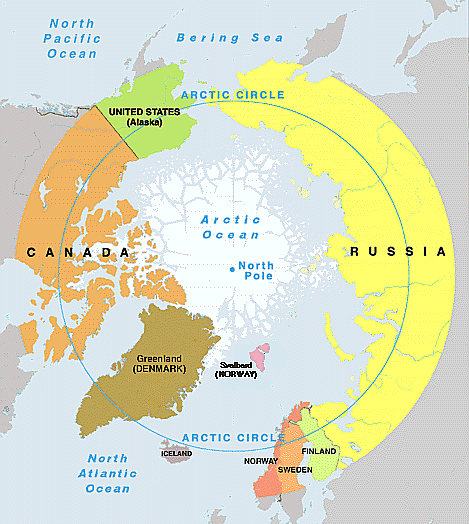 International Cooperation Needed on Arctic Research. International Cooperation Needed on Arctic Research. Scientists, the fishing industry and university students gathered for the 2017 Alaska Marine Science Symposium in Anchorage Jan. 23 got an update on highlights of Arctic research, plus a plea to get learn more and share climate change information.With the Arctic region undergoing rapid and dramatic change, impacting communities and economies, "this is an area where we need as much work as possible to understand what is taking place, and to make that information available to decision makers," said Fran Ulmer, chair of the U.S. Arctic Research Commission, and one of several keynote speakers. The Cordova Times
Russia and Finland Agree to Continue Studying of Black Carbon Emissions in the Arctic. At the 37th meeting of Russia-Finland Joint Commission on Maritime Shipping held in Helsinki the delegations of the two parties agreed on the necessity to continue studying black carbon emissions in the Arctic, says press center of Rosmorrechflot's Marine Rescue Service. The Russian side emphasized the necessity to consider this issue in the context of contamination risk recognition in the field of transportation and use of heavy fuel by ships, development of the risk reduction measures rather than introduction of prohibitive measures. PortNews
Study Predicts Widespread Damage to Russian Arctic Infrastructure From Thawing Permafrost. A new study says the thawing of permafrost accelerated by a warming climate could destabilize at least a quarter of Russia's Arctic urban infrastructure by the year 2050. And in a worst-case scenario, it could damage up to three-quarters of the roads, buildings, pipelines and other structures in the Russian Arctic by midcentury, according to the study co-authored by U.S. and Russian researchers and published recently in Geographical Review. KUAC
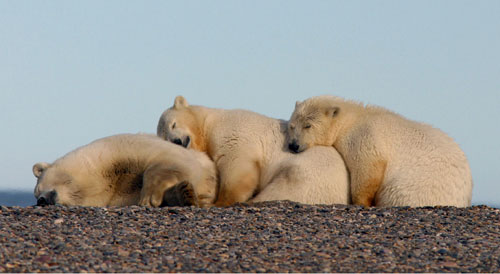 Chukchi Sea Polar Bears are Thriving but Only in the Short Term. Chukchi Sea Polar Bears are Thriving but Only in the Short Term. If there's a poster child for Arctic animals affected by climate change, it's the polar bear. But the data behind those famous furry faces tells a more complicated story. Dr. Eric Regehr is a biologist with the U.S. Fish and Wildlife Service in Anchorage. He's the lead author of a new study on the global conservation status of polar bears. Assessments of the conservation status of polar bears have been done before, but this is the first one that takes a data-based, quantitative approach. KTOO
[Canadian] Bid to Monitor Traffic in Arctic Waters Hits Snags. An eight-year effort to develop year-round surveillance capability in Canada's melting Arctic waters was only ever able to monitor marine traffic remotely twice for a few weeks during the hospitable northern summers. As Canada prepares to spend more than $130 million on new proposals to keep watch over the Arctic, the quiet conclusion reached by military scientists involved in the previous technology demonstration project was that constant tracking of the cruise ships, fishing vessels and hostile forces was a possibility - but a distant one. Toronto Star
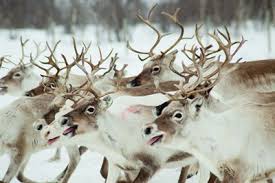 Alaska Biologists Research Mystery of Declining Caribou Herd. Alaska Biologists Research Mystery of Declining Caribou Herd. The size of a large caribou herd in Alaska's Arctic region has dropped by more 50 percent over the last three years, and researchers who have tentatively ruled out hunting and predation as significant factors for the decline are trying to determine why. The state's Central Arctic herd, which roams an area of north-central Alaska about the size of Ohio, hit a peak of about 70,000 caribou in 2010. Allied News
|
|
Future Events
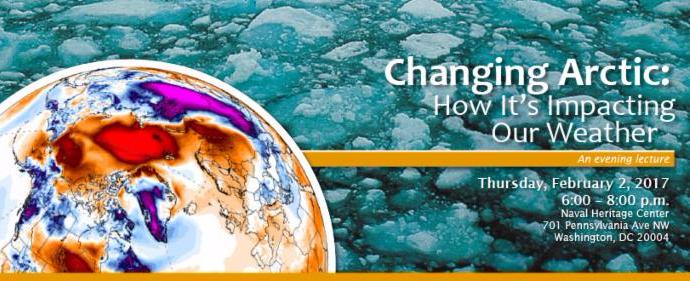 Changing Arctic: How It's Impacting Our Weather, February 2, 2017 (Washington, DC USA). Changing Arctic: How It's Impacting Our Weather, February 2, 2017 (Washington, DC USA). Profound changes in the Arctic have coincided with more frequent extreme weather events across the mid-latitudes, was as Washington, DC. These events include intense heat and rainfall, and severe winter cold spells and snow storms. Scientists are actively addressing if and how Arctic change is connected to these events, which impact economies, geopolitics, security, and society at large. The evening lecture will feature experts discussing scientists' understanding of these events and the impact this has on society. This event is hosted by US CLIVAR (US Climate Variability and Predictability Program)
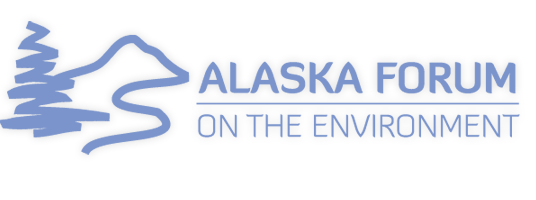 Alaska Forum on the Environment, February 6-10, 2017 (Anchorage, AK USA). Alaska Forum on the Environment, February 6-10, 2017 (Anchorage, AK USA). This statewide gathering of environmental professionals, community leaders, Alaskan youth, conservationists, biologists and community elders will be holding its 19th meeting to continue providing a strong educational foundation for all Alaskans and a unique opportunity to interact with others on environmental issues and challenges. As many as 1,800 people are expected to attend AFE this years meeting.
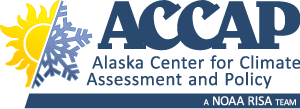 ** New this week ** Alaska Center for Climate Assessment and Policy Climate Webinar, February 14, 2017 (Webinar). ** New this week ** Alaska Center for Climate Assessment and Policy Climate Webinar, February 14, 2017 (Webinar). The National Climate Assessment (NCA) is produced every four years by the U.S. Global Change Research Program (USGCRP). The USGCRP, under the Global Change Research Act of 1990, is mandated to deliver a status report to the President and Congress that evaluates, integrates and interprets the findings of their federal research program on global change. The NCA aims to integrate new information on climate science into the context of larger social, ecological, and policy systems. It will provide an updated report of climate change impacts and vulnerability, evaluate the effectiveness of mitigation and adaptation activities, and identify knowledge gaps. Alaska has been identified as one of 10 Regional Assessments to be included in the 2018 national report. The purpose of the presentation is to provide a brief background on the NCA, present some current topical areas will include, and seek public feedback. It is hoped that the audience can provides feedback on current landscape changes that are affecting their lifestyles.
6th Annual Fletcher Arctic Conference, February 17-18, 2017 (Medford, MA USA). Fletcher Arctic VI, a TEDx-style event, will showcase the ideas, stories, and initiatives of people who live and work in the Arctic. The conference will bring together inspiring leaders, innovative business people, expert scientists, and artists from the pan-Arctic region. Building on The Fletcher School's interdisciplinary approach, Fletcher Arctic VI will be a forum to engage in conversation and spark open and constructive debate between speakers and participants, providing deep insights into this unique and rapidly changing region.
IV International Forum, March 2017 (Arkhangelsk, Russian Federation) Arkhangelsk will host the Forum. The Forum will be titled Human in the Arctic and will be aimed at putting together joint efforts of the international community to promote effective development of the Arctic region as a territory for comfort life, work and leisure. The Forum will be attended by government officials, representatives of international organizations and prominent business communities, centers for political studies, Polar researchers and members of the international Arctic expeditions, foreign political scientists and economists, Russian and foreign journalists from leading international media organizations. The Forum will be attended by the President of the Russian Federation, Mr. Vladimir Putin. Additional information will be announced here.
The 4th annual Arctic Encounter Symposium (AES) will convene policymakers, industry leaders, and leading experts to confront the leading issues in Arctic policy, innovation, and development in Seattle, WA at the Bell Harbor International Conference Center. As the largest annual Arctic policy event in the United States, the AES mission is to raise awareness, engage challenges, and develop solutions for the future of a region and a people. The two-day program includes two keynote luncheons, expert plenary sessions, break out sessions, a networking cocktail reception and seated three-course dinner.
- The Arctic Cryosphere
- Pollution in the Arctic
- Human Health Aspects of Pollution and Climate Change
- Global and Arctic Systems Feedback Mechanisms
- Resilience within Arctic Ecosystems
- Science and Policy Making
- Socio-Economic Drivers and Impacts of Arctic Change
Organizers announce a call for abstracts which are due by December 2, 2016. The event is organized by the Arctic Monitoring and Assessment Program (AMAP).
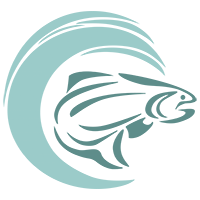 Impacts of a Changing Environment on the Dynamics of High-Latitude Fish and Fisheries, May 9-12, 2017 (Anchorage, Alaska USA).This symposium examines the impacts of the environment, especially climate change and variability, on the dynamics of arctic and sub-Arctic species of commercial, subsistence, and ecological importance. The symposium will focus on the effects of warming, loss of sea ice, ocean acidification, and oceanographic variability on the distribution, phenology, life history, population dynamics, and interactions of these species and how a better understanding of these effects can inform the assessment and management of fish and invertebrate populations in a changing ocean for the benefit of affected communities. Impacts of a Changing Environment on the Dynamics of High-Latitude Fish and Fisheries, May 9-12, 2017 (Anchorage, Alaska USA).This symposium examines the impacts of the environment, especially climate change and variability, on the dynamics of arctic and sub-Arctic species of commercial, subsistence, and ecological importance. The symposium will focus on the effects of warming, loss of sea ice, ocean acidification, and oceanographic variability on the distribution, phenology, life history, population dynamics, and interactions of these species and how a better understanding of these effects can inform the assessment and management of fish and invertebrate populations in a changing ocean for the benefit of affected communities.
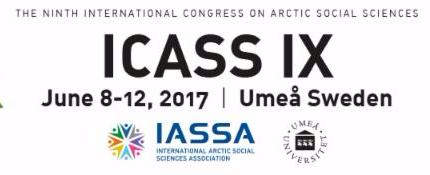 Ninth International Congress of Arctic Social Sciences: People and Places (ICASS IX), June 8-12, 2017 (Umea, Sweden). ICASS IX's theme is People & Place. Research on social sciences and humanities have a great responsibility to address the challenges for sustainable development in the Arctic, with a specific focus on the many different parts of the Arctic and the people that live there. The multiple Arctics have lately been addressed by many policy makers and researchers. The purpose is often to counteract the stereotypic understanding of the Arctic too often represented by icebergs and polar bears. A focus on people and place highlights the many variances across the region in terms of climate, political systems, demography, infrastructure, history, languages, legal systems, land and water resources etc. Ninth International Congress of Arctic Social Sciences: People and Places (ICASS IX), June 8-12, 2017 (Umea, Sweden). ICASS IX's theme is People & Place. Research on social sciences and humanities have a great responsibility to address the challenges for sustainable development in the Arctic, with a specific focus on the many different parts of the Arctic and the people that live there. The multiple Arctics have lately been addressed by many policy makers and researchers. The purpose is often to counteract the stereotypic understanding of the Arctic too often represented by icebergs and polar bears. A focus on people and place highlights the many variances across the region in terms of climate, political systems, demography, infrastructure, history, languages, legal systems, land and water resources etc.
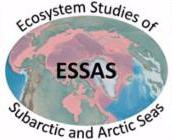 2017 ESSAS Open Science Meeting on Subarctic and Arctic Science, June 11-15, 2017 (Tromsø, Norway). 2017 ESSAS Open Science Meeting on Subarctic and Arctic Science, June 11-15, 2017 (Tromsø, Norway). This 3rd Open Science Meeting (OSM) is intended to attract an interdisciplinary group of scholars who will be prepared to discuss their research in the Subarctic, in both the North Atlantic and the North Pacific, and the Arctic Ocean. The title of the OSM is Moving in, out and across the Subarctic and Arctic marine ecosystems: shifting boundaries of water, ice, flora, fauna, people and institutions. It will document the changes that have occurred, the processes that led to these changes, and how future changes are likely to further affect these marine ecosystems. It will also to consider the people who depend upon these ecosystems and how they may be able to cope with the changes in the ecosystem goods and services that they derive from these ecosystems. These include the availability of subsistence foods and the opportunity for commercial fishing. Economic and societal pressures on coastal communities and nations will be sought in relation with the ecosystem changes. To put the present day in a longer perspective, the conference will include a session on the paleoecology of people in Subarctic and Arctic regions that were forced to adjust to the changing temperature and sea-ice conditions in the past.
The 2nd Asian Conference on Permafrost, July 2-6, 2017 (Sapporo, Japan). Delegates will participate in state-of-the-art oral and poster presentations in the modern city of Sapporo (host of the 1972 Winter Olympics). Field trips will visit marginal and extrazonal mountain permafrost sites that support unique geo-eco-hydrological features. All aspects of frozen ground research will be covered, from needle ice to deep permafrost, from frozen ground engineering in cities to permafrost on volcanoes, and from links between frozen ground and ancient cultures to present-day outreach. Plan now to enjoy science and engineering, excellent food, and unique field trips in Sapporo.
Co-hosted by U.S. National/Naval Ice Center (NIC) and the U.S. Arctic Research Commission (USARC). A biennial symposium originating in 2001 that focuses on U. S. naval operations and national strategic issues in an "ice-free Arctic." This symposium brings together nationally and internationally recognized experts on Arctic observations, climate change, and maritime operations.
 2017 University of the Arctic Rectors' Forum and Conference, August 27-29, 2017 (Aberdeen, Scotland). This conference will also consider how northern scholarship can add to discussions on the North into broader terrains of intellectual engagement. In so doing, it will challenge dominant paradigms of research in both the natural and the social sciences, above all by calling into question the very separation of the world of nature from that of human society which underwrites the distinction between these two branches of scientific inquiry. In its place the conference will seek to forge a new practice of interdisciplinary research, done in collaboration with northern residents and on their terms, which recognizes that every discipline is itself an ongoing conversation, or a way of knowing, rather than a compartment within an overarching, hierarchically organized system of knowledge. Conversations from the North will, then, help to generate a science that is more open-ended, responsive to environmental variation and respectful of the wisdom of inhabitants. 2017 University of the Arctic Rectors' Forum and Conference, August 27-29, 2017 (Aberdeen, Scotland). This conference will also consider how northern scholarship can add to discussions on the North into broader terrains of intellectual engagement. In so doing, it will challenge dominant paradigms of research in both the natural and the social sciences, above all by calling into question the very separation of the world of nature from that of human society which underwrites the distinction between these two branches of scientific inquiry. In its place the conference will seek to forge a new practice of interdisciplinary research, done in collaboration with northern residents and on their terms, which recognizes that every discipline is itself an ongoing conversation, or a way of knowing, rather than a compartment within an overarching, hierarchically organized system of knowledge. Conversations from the North will, then, help to generate a science that is more open-ended, responsive to environmental variation and respectful of the wisdom of inhabitants.
- Small and off-grid community energy solutions
- Oil and gas development
- Renewable energy
- Regulation and Financing
- Transportation and transmission
The AES is a multi-disciplinary event expected to draw several hundred industry officials, scientists, academics, policy makers, energy professionals and community leaders together to collaborate and share leading approaches on Arctic energy issues.
 Polar Law Symposium 2017 and Rovaniemi Arctic Spirit, November 13-16, 2017 (Rovaniemi, Finland). The purpose of the Polar Law Symposium is to examine, in detail, the implications of the challenges faced by the Polar Regions for international law and policy and to make recommendations on appropriate actions by states, policy makers and other international actors to respond to these emerging and re-emerging challenges. The Rovaniemi Arctic Spirit Conference is integrated with the Polar Law Symposium, which will be organized by the Northern Institute for Environmental and Minority Law at the Arctic Center of the University of Lapland. Polar Law Symposium 2017 and Rovaniemi Arctic Spirit, November 13-16, 2017 (Rovaniemi, Finland). The purpose of the Polar Law Symposium is to examine, in detail, the implications of the challenges faced by the Polar Regions for international law and policy and to make recommendations on appropriate actions by states, policy makers and other international actors to respond to these emerging and re-emerging challenges. The Rovaniemi Arctic Spirit Conference is integrated with the Polar Law Symposium, which will be organized by the Northern Institute for Environmental and Minority Law at the Arctic Center of the University of Lapland.
 POLAR 2018, June 15-27, 2018 (Davos, Switzerland). POLAR2018 is a joint event from the Scientific Committee on Antarctic Research (SCAR) and the International Arctic Science Committee (IASC). The SCAR meetings, the ASSW and the Open Science Conference will be hosted by the Swiss Federal Institute for Forest, Snow and Landscape Research WSL under the patronage of the Swiss Committee on Polar and High Altitude Research. The WSL Institute for Snow and Avalanche Research SLF is organizing POLAR2018. POLAR 2018, June 15-27, 2018 (Davos, Switzerland). POLAR2018 is a joint event from the Scientific Committee on Antarctic Research (SCAR) and the International Arctic Science Committee (IASC). The SCAR meetings, the ASSW and the Open Science Conference will be hosted by the Swiss Federal Institute for Forest, Snow and Landscape Research WSL under the patronage of the Swiss Committee on Polar and High Altitude Research. The WSL Institute for Snow and Avalanche Research SLF is organizing POLAR2018.
As the Symposium is organized jointly by two leading Research Institutes of Russian Academy of Science - Institute of Water Problems and Melnikov Permafrost Institute, particularly the contributions on following research topics are welcome:
- Observational evidences of change in coupled permafrost-hydrology system.
- Present state and future projections of local, regional and pan-Arctic hydrology.
- Modeling studies representing landscape evolution, dynamics of water storages and permafrost degradation.
- Impacts of permafrost hydrology changes on local communities."
VII International Conference on Cryopedology, August 21-25, 2017 (Yaktsk, Russia). The conference will be hosted by the Institute for Biological Problems of the Cryolithozone of the Siberian Branch of the Russian Academy of Sciences (SB RAS). Plenary reports will be organized in the hall of the Academy of Sciences of the Sakha (Yakutia) Republic. The official languages of the conference are English and Russian (with translation). All technical facilities (projectors, computers, video sets) will be available during the conference for presentation of papers. Additional information will be available soon. See the Facebook page here.
|
|

  
4350 N. Fairfax Drive, Suite 510
Arlington, VA 22203, USA
External links in this publication, and on the USARC's World Wide Web site ( www.arctic.gov) do not constitute endorsement by the US Arctic Research Commission of external Web sites or the information, products or services contained therein. For other than authorized activities, the USARC does not exercise any editorial control over the information you may find at these locations. These links are provided consistent with the stated purpose of this newsletter and the USARC Web site.
|
|
|
|
|
|
|
|
|